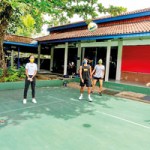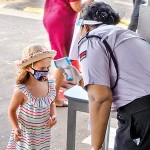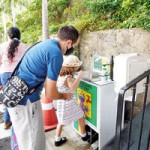Creating a Safe Environment in Schools to Continue Lessons
View(s):The COVID-19 pandemic has caused the largest disruption of education in history, having had a universal impact on learners and teachers around the world. In the report of the framework for reopening schools of the UNICEF, one of the main factors was to consider the responses to the following question: What is the capacity of the school to maintain safe school operations to mitigate risks, such as social distancing and water, sanitation and hygiene facilities and practices?
I would like to take The Overseas School of Colombo (OSC) as an example and discuss the measures that the school has taken in response to the above question. OSC has prioritised a child’s well being over academics, with the understanding that optimal learning cannot take place without a healthy body, healthy mind, and a sense of belonging.
The school has a mandatory mask policy. If there is no mask, there is no campus access. The OSC signature face masks are manufactured with 5 water resistant layers. They have been tested to have a bacterial filtration efficiency of 98.8% even after 10 washes. Upon entering the campus, and throughout the day, everyone must wash their hands with soap and water and use correct hand washing techniques (20-30 seconds) at the stations provided. The bottom of all footwear is sanitised using appropriate chlorinated foot baths available at every entrance of the campus.
Hand washing sinks with automatic foot pedals for operation have been created and placed around the campus for ease and frequency of use, while the hand wash and soap systems at the entrance points are motion sensitive. Sensor taps have been placed in the washrooms too. Air-drying is available and paper too is provided to be discarded properly in the closed bins. Hand sanitising gel is placed at all entry points, throughout the school, and in classrooms. However, the community has been advised that sanitising is secondary to washing hands well with soap and water.
All who enter the campus are temperature-screened using non-contact thermometers that are calibrated daily. If the temperature of any person is greater than 37.0℃ the child will be asked to sit quietly for a few minutes until the School Doctor arrives, and then a second and maybe third temperature reading will be taken, orally by the Doctor. If the temperature remains above 37.0℃ the parents will be called to collect their child from school immediately.
Daily sanitisation of belongings will be part of the system provided by OSC. The school aims for and encourages social distancing with 1 meter when masks on and 2 meters when masks off during mealtimes. The 1-meter distancing is possible within classrooms due to the spacious classrooms and the small number of students in a classroom (usually about 15). Fresh air flow circulation facilities are there in all classrooms and in addition each room has an installed air purifier. Personnel have been employed for sanitising handrails, door handles and high contact areas at regular intervals and bathrooms are disinfected after every use. In fact, door handles are not needed to be used as foot operated devices have been fitted for all doors. Designated eating areas and play areas have been allocated for grade levels.
If a child or adult develops symptoms and/or they are suspected to have acquired COVID-19, they will be accompanied by a health professional to the Medical Office and Quarantining Room, designated for this purpose. The School Doctor will assess that person, and determine the next steps using the School’s Suspected Case Action Pathway.
In addition, the school has employed three counselors to cater to students of different age groups which includes helping and guiding those who have difficulties in adjusting to these health protocols. It is evident that The Overseas School of Colombo, like many other schools, have implemented a whole lot of measures to create a safe environment for the students and staff. These are extraordinary times, but It is our responsibility to do whatever possible to enable a non-disruptive educational programme for the younger generation. “You can’t control what goes on outside, but you CAN control what goes on inside.”
R.N.A. de Silva
ndesilva@osc.lk
The author is a member of the faculty of The Overseas School of Colombo and is a senior examiner of the International Baccalaureate Organisation.







